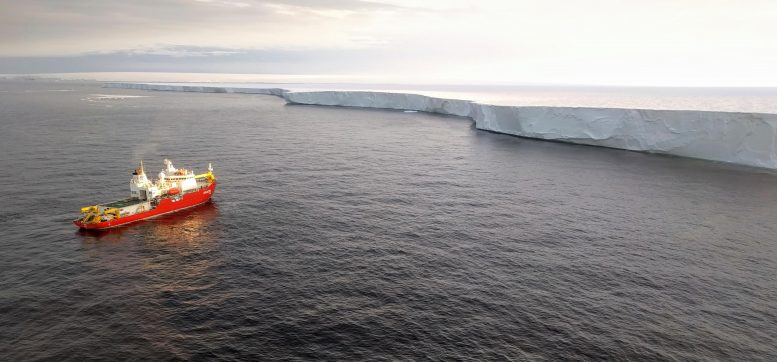
Glaciers in West Antarctica are moving more quickly from land into the ocean, contributing to rising global sea levels. A 25-year record of satellite observations has been used to show widespread increases in ice speed across the Getz sector for the first time, with some ice accelerating into the ocean by nearly 50%.
The new study, led by the University of Leeds, reports that 14 glaciers in the Getz region are thinning and flowing more quickly into the ocean. Between 1994 and 2018, 315 gigatonnes of ice have been lost, adding 0.9 mm to global mean sea level – equivalent to 126 million Olympic swimming pools of water.
The results published today (19/02/2021) in the journal Nature Communications show that, on average, the speed of all 14 glaciers has increased by almost a quarter with three glaciers’ speeding up by over 44 %. This research will help scientists determine whether glaciers in the region may collapse in the next few decades and how this could affect future global sea-level rise.
Heather Selley, lead author of the study and a glaciologist at the Centre for Polar Observation and Modelling at the University of Leeds, said: “The Getz region of Antarctica is so remote that humans have never set foot on most of this part of the continent. Satellite radar altimetry records have shown substantial thinning of the ice sheet.
“However, the high rates of increased glacier speed – coupled with ice thinning – now confirms the Getz basin is in ‘dynamic imbalance’, meaning that it is losing more ice than it gains through snowfall.
“Using a combination of observations and modeling, we show highly localized patterns of acceleration. For instance, we observe the greatest change in the central region of Getz, with one glacier flowing 391 m/year faster in 2018 than in 1994. This is a substantial change as it is now flowing at a rate of 669 m/year, a 59% increase in just two and a half decades.”
The research, funded by the Natural Environment Research Council (NERC) and the European Space Agency (ESA), reports how the widely reported thinning and acceleration observed in the neighboring Amundsen Sea glaciers, now extends over 1,000 km along the West Antarctic coastline into Getz.
Dr. Anna Hogg, study co-author and climate researcher in Leeds’ School of Earth and Environment said: “The pattern of glacier acceleration shows the highly localized response to ocean dynamics.
“High-resolution satellite observations from satellites such as ESA’s Sentinel-1, which collects a new image every six days, means we can measure localized speed changes with ever greater detail.
“Consistent and extensive sampling of both ice speed and ocean temperature are needed to further our understanding of the dynamic ice loss, which now accounts for 98.8 % of the Antarctica’s sea level contribution.”
By examining 25 years of ocean measurements, the research team were able to show complex and annual variations in ocean temperatures. These results suggest that the “dynamic imbalance” is mainly caused by longer-term ocean forcing, where increased heat content in the ocean is interacting with the ice and enhancing melt.
Pierre Dutrieux, study co-author and climate researcher at British Antarctic Survey, said: “We know that warmer ocean waters are eroding many of West Antarctica’s glaciers, and these new observations demonstrate the impact this is having on the Getz region.
“This new data will provide a new perspective of the processes taking place so we can predict future change with more certainty.”
Read Getz on the Run: Accelerating Pace of Antarctic Glaciers for more on this research.
Reference: “Widespread increase in dynamic imbalance in the Getz region of Antarctica from 1994 to 2018” by Heather L. Selley, Anna E. Hogg, Stephen Cornford, Pierre Dutrieux, Andrew Shepherd, Jan Wuite, Dana Floricioiu, Anders Kusk, Thomas Nagler, Lin Gilbert, Thomas Slater and Tae-Wan Kim, 23 February 2021, Nature Communications.
DOI: 10.1038/s41467-021-21321-1
The research team led by the University of Leeds included colleagues from Swansea University, Colombia University, British Antarctic Survey, ENVEO IT GmbH, Remote Sensing Technology Institute in Germany, University of Denmark, University College London and Korea Polar Research Institute.
Researchers in this study were supported by various grants. Anna E. Hogg was supported by the NERC DeCAdeS project (NE/T012757/1) and ESA Polar+ Ice Shelves project (ESA-IPL-POE-EF-cb-LE-2019-834). Pierre Dutrieux was supported by NSF awards 1643285, 1644159, and a Columbia University Climate and Life Fellowship. Tae-Wan Kim from the Korea Polar Research Institute, grant KOPRI PE20160.